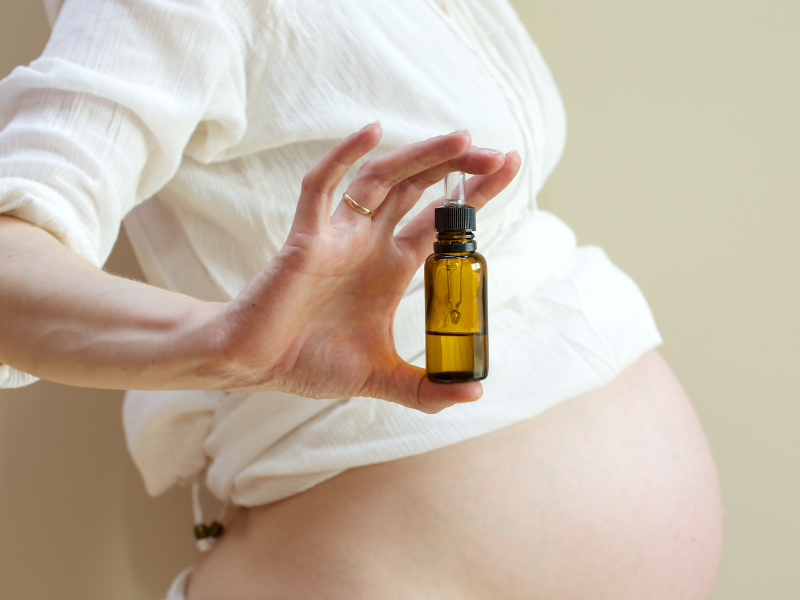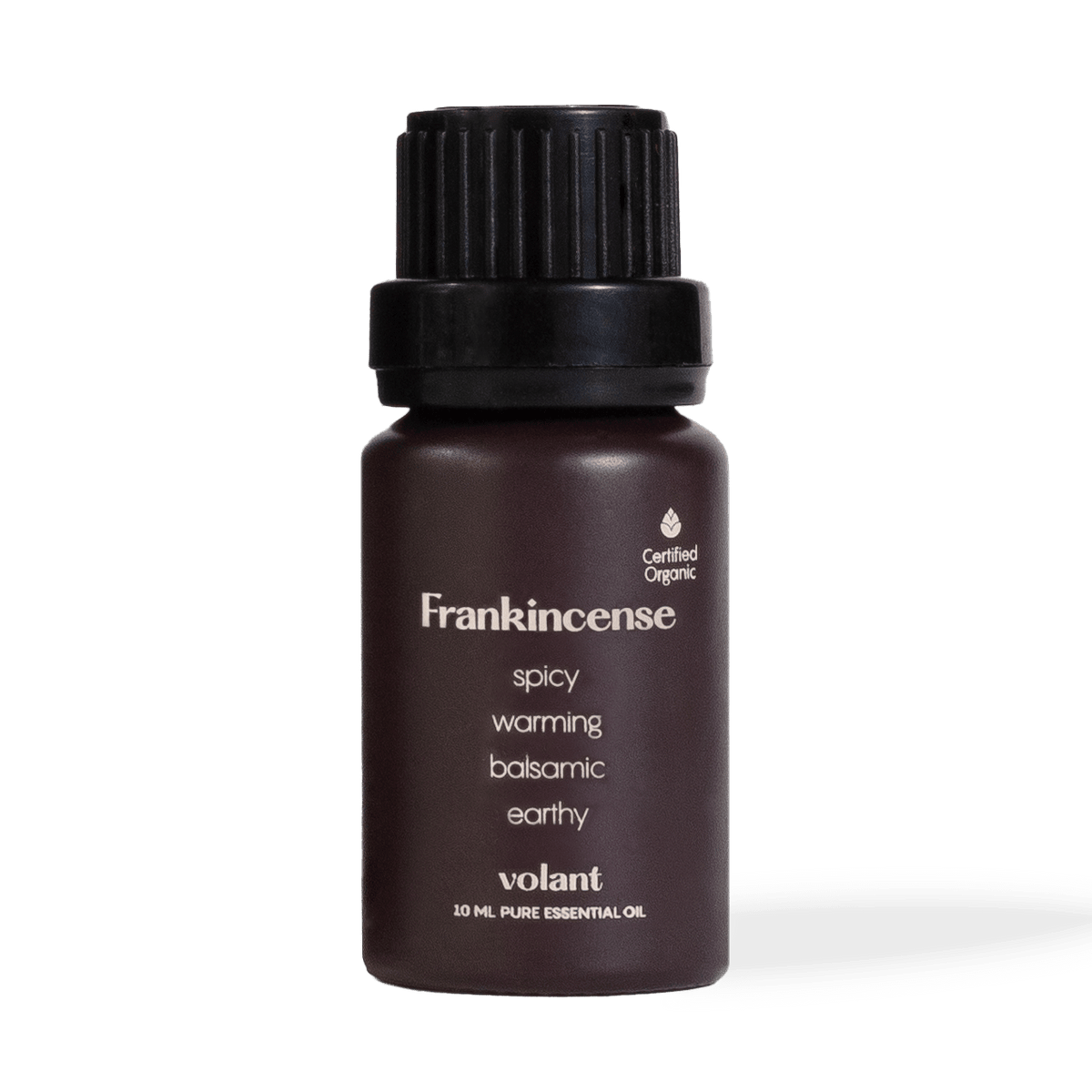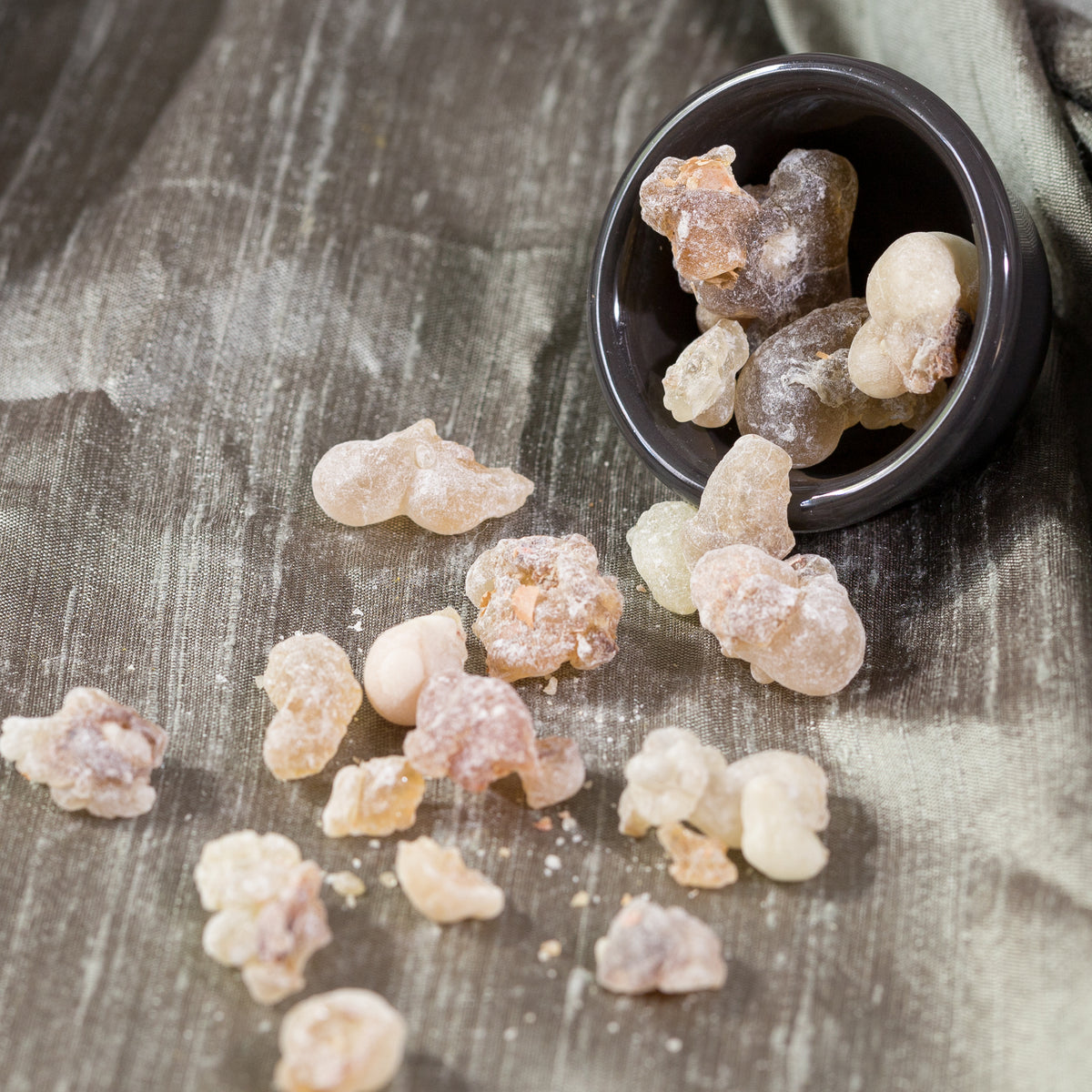Certain essential oils have been proven to help women deliver babies with markedly less pain and discomfort while making it a more pleasant experience, and they can help you during your pregnancy and after delivery too. Should you decide to put an essential oils for labor kit together using the advice given here, you may find the relief that many other women have reported using these oils.
If you’d like to find out more about using essential oils safely and effectively while you’re in labor, this guide covers everything you need to know.
Why can essential oils help during labor?

Essential oils are powerful mixtures created from particular aromatic plants. Their scents may trigger certain reactions in your body and brain, which is why they can help you to remain calmer and more comfortable. They may also have direct therapeutic effects on your hormones and neurotransmitters, affecting your mind, body and emotions in favorable ways.
The list of essential oils for labor and delivery is a long one and includes oils that can boost your mood, reduce your stress, improve the quality of your sleep, kill bacteria and fungi and prevent inflammation.
How do essential oils help with labor?

When you use essential oils for labor, you may find yourself becoming calmer and more relaxed during the process. This is because the right types of 100% pure, organic oil can help your mind and muscles relax, reduce pain, lessen nausea and may even encourage contractions.
You’ll be pleased to know that using an essential oils for labor kit may also help your skin to heal more quickly post-birth. The use of these oils may also lessen the likelihood of your ending up with permanent scarring or stretch marks.
As an additional therapeutic tool, essential oils can ensure that your body, mind and spirit are in as good a space as possible while you bring your baby into the world.
How to use essential oils for labor
When using essential oils for labor and delivery, the details of how you go about this are up to you. They will also largely depend on what you’ve planned for the birth. It’s recommended - if you’ve had a healthy, straightforward pregnancy - that you use essential oils from the early stages of labor right through until the birth, and even after if you wish to.
You can begin introducing essential oils as early on as your third trimester. But, if you do this, bear in mind that you may no longer like the scent of oils you previously used. Pregnancy can trigger a different reaction to smell and/or taste in your body. The key is to listen to your body and make yourself as comfortable as possible.
Remember to always dilute whatever essential oils you’ve chosen with a carrier oil before you use them topically. Once you’ve diluted the oils, you’ll need to do a patch test to make sure you don’t have any kind of allergic reaction. (Of course, you’ll want to plan ahead and do this well ahead of your labor and delivery!) A good ratio to keep in mind when blending essential oils and carrier oils is 3-4 drops of essential oil to every tablespoon (about 15 ml) of carrier oil - or less if you tend to be more sensitive.
When using essential oils during pregnancy and labor, you can try the following options:
Add your essential oil mix to your bath

Having a bath with a few drops of diluted essential oils is fine during the early stages of labor, as long as your water hasn’t yet broken. In fact, if your amniotic sac is still intact, a nice warm bath may be just the thing to help you relax.
Create a spray

Whether or not you can use an essential oil mist or spray will depend on the details of your birth. If you’re in a private space, for example, this shouldn’t be a problem.
If possible, creating a mist is easy and can really help. Fill a spray bottle with distilled water and add 10-15 drops of the recommended essential oils for labor and delivery to it.
Shake well before each use and then use this spray in the air around you or by applying it to your body directly. This will set the mood for a calm and peaceful birth.
Make an ointment

You can make a salve using the best essential oils for labor by adding your diluted mix to a lotion you already love or applying it diluted with a carrier oil directly to specific points on your body. You may find rubbing this ointment on your forehead, palms, scalp and soles of your feet very effective.
Why use essential oils for labor?

Putting an essential oils for labor kit together can be a wonderful, natural option for women during their pregnancy, through the birthing process, and beyond. Aromatherapy complements traditional medicine when used responsibly and you may find that the use of oils plays a large role in ensuring the birthing experience is a positive one.
Just remember that you should always consult your doctor, doula, OB/GYN or midwife before you start exploring what essential oils for labor and delivery can do for you. Medical health professionals will be able to help you decide which oils will work best as well as inform you immediately if you’re considering something unsafe.
Top essential oils for labor
With almost 100 different options to choose from, it stands to reason that not every oil is on the list of good essential oils for labor and delivery. These oils, however, have made the cut and can safely be used after you’ve done the necessary checks:
Lavender

Lavender is the most studied essential oil for use during labor with the most consistent results. Use Lavender Essential Oil to promote relaxation, reduce anxiety, ease muscular tension and reduce pain during active labor, and let it do this work while you’re pregnant, too.
You can keep using lavender once your baby has arrived to help you get the much-needed sleep you need before your new arrival wakes up again, as well as to help ward off postpartum depression.
Frankincense

Volant’s organic Frankincense Essential Oil will calm your emotions while its anti-inflammatory and pain-relieving properties can lessen the discomfort you may experience in your lower back and abdomen. Rub the diluted oil onto these areas. You'll also benefit from the fact that it’s said to tone and strengthen the uterus.
This essential oil is also energizing, both mentally and physically, something which is very useful during the intensity of labor. You can even use it after your birth to revitalize you when the going gets tough.
Sweet Orange

Because it can reduce your levels of anxiety and stress while it revives lagging energy and lifts your spirits, Sweet Orange Essential Oil is a must-have. It’s one of the best choices to add to your essential oils for labor kit for all of these reasons.
Geranium

Interestingly, people either adore the smell of Geranium Essential Oil or they can’t stand it, but its therapeutic properties are indisputable.
It’s an excellent choice for hormone balancing during labor, and it can help speed up this process as it promotes relaxation in labor. If you don’t like its aroma, you can disguise it with sweet orange, chamomile or peppermint essential oils.
Peppermint

This essential oil is an excellent choice if you’re suffering from nausea during your labor. Inhale the scent of Peppermint Essential Oil or enjoy it in a massage and you’ll not only combat gassiness and stomach upset, you’ll benefit from its pain and anxiety relief properties too.
It’s also a powerful ally against headaches and dizziness that may accompany contractions and other signs of labor.
Roman Chamomile

Roman Chamomile Essential Oil can help you to deal with labor pain that you may experience during labor as well as the inevitable lack of sleep that follows having a newborn.
Roman chamomile is a recommended essential oil for labor and beyond because massaging your body with a dilution of it post-delivery can ease your aches, bruises and pains, promote relaxation and improve sleep.
Other essential oils with benefits shown during labor:
- Jasmine essential oil in aromatherapy massage for pain during labor
- Damascus rose essential oil inhalation and footbath for pain and anxiety during labor (although lavender is likely more effective)
- Bitter orange essential oil aromatherapy for labor pain and anxiety
- Clove essential oil aromatherapy for labor pain and anxiety
- Clary sage aromatherapy and massage (in combination with other oils) for labor pain and anxiety
What the science says about essential oils for labor
With the upswing in interest in alternative therapies, scientists and researchers have started delving more deeply into how effective essential oils are for a range of purposes, including during labor.
It’s safe to say that multiple studies have come to the same conclusion as many women who have given birth: that using essential oils during labor can be very helpful.
Lavender essential oil and pain and anxiety in labor
The evidence from this research suggests that a range of essential oils, including lavender, offer assistance in relieving pain during labor and lessen maternal anxiety overall. Lavender has been the most heavily studied, as can be seen in this review, and many studies have found that both aromatherapy and aromatherapy massage with lavender is effective, and that massage with lavender is more effective than massage without aromatherapy.
One study also found that lavender accomplishes some of these effects in part by reducing cortisol and increasing serotonin levels in laboring women.
Frankincense essential oil reduces pain and anxiety in women in labor
When the outcome of exposing women struggling with labor pain to frankincense was reviewed, this study found that the results were uniformly positive.
Its results have been confirmed, with aromatherapy with frankincense essential oil (in combination with clary sage, Roman chamomile, lavender and mandarin oils) reducing pain and resulting in fewer babies being transferred to the NICU in one study.
Aromatherapy massage from the laboring woman’s spouse with a mixture of frankincense, lavender, neroli and clary sage was found to reduce anxiety and labor pain in another study.
Roman chamomile oil reduces pain and anxiety in women in labor
Aromatherapy with chamomile essential oil was found to reduce labor pain as early as 3 cm dilated through delivery. Cotton balls were soaked in either two drops of chamomile essential oil or distilled water and attached to the women’s gowns at the neckline. The chamomile oil reduced labor pains.
As noted above, chamomile oil was also one of five essential oils that reduced pain and resulted in fewer babies being sent to the NICU when used as aromatherapy with laboring women.
Orange essential oil’s positive effects on mood of women in labor
A 2015 study concluded that essential oils like sweet orange are a non-invasive and effective method to help women overcome anxiety during labor. It also found that this scent can help pregnant women experiencing stress.
Geranium essential oil’s relaxation effects on women in labor
Another 2015 study compared the effects of inhaling sweet orange with geranium essential oils during labor. They found that geranium’s relaxation and sedative effects were superior to that of sweet orange essential oil aromatherapy.
Peppermint essential oil’s pain and anxiety relief effects on women in labor
A similar study design to the one above with chamomile oil-soaked cotton balls was done with peppermint essential oil. Peppermint oil was shown to reduce labor pain and anxiety when inhaled. A follow-up study compared peppermint with clove oil during labor and found that clove oil was very effective, if not more. Combine the two for a powerful combination.
Using essential oils safely during labor

The key to using essential oils for labor is doing so safely and responsibly. Educate yourself about whichever oils you end up choosing to use, speak to your health professional or midwife before commencing use, and bear the following in mind:
- Don’t use lavender essential oil if you’ve had an epidural, are experiencing hypotension or struggle with fainting episodes.
- If you’re asthmatic, avoid using essential oils derived from flowers.
- Avoid using essential oils in the bath after your water has broken and don’t add them directly into your birthing pool. The water sac protects your baby, and without it, essential oils are not safe for your baby to come into contact with.
Effective blends of essential oils for labor
Experiment with different mixes of essential oil in the days leading up to your labor and you may find your own signature scent that will make your birthing experience more pleasant.
Get started making a blend with these recipes, for which you’ll need carrier oils, essential oils, roller bottles, a spray bottle or a diffuser.
For pain relief
Mix 5 drops each of lavender, chamomile and frankincense essential oils with 4 tablespoons (or 60 ml) of the carrier oil of your choice. Jojoba oil is a great neutral carrier oil; grapeseed oil works well too. Rub the mix on your abdomen, lower back, shoulders or wherever you need relief, or add the blend to your diffuser to inhale it.
For staying calm
Combine 10 drops of lavender and geranium essential oil with a carrier oil and roll or massage the mixture into your back, chest and/or wrists. Once again, adding it to your diffuser so it can scent the air around you is also a great choice.
For energy
Combine 4 drops each of essential oils for labor like sweet orange, frankincense and peppermint and top up with a carrier oil. Apply this blend to the back of your neck and underneath your feet during labor and delivery to give you the extra oomph you need to persevere and get the job done.
This blend will also provide an excellent pick-me-up after your baby’s birth.
Essential oils for labor FAQs
Can I use essential oils during labor?
Yes, you can safely use certain oils during labor as long as you’re doing so in the recommended way.
What essential oils are best for women in labor?
After you’ve established that you’re not allergic to them, we recommend lavender, frankincense, peppermint, Roman chamomile, geranium and sweet orange essential oils.
How do you use essential oils during labor?
This depends on your personal preferences and the environment you’re giving birth in. Topical application and diffusers are the best options, and adding them to your bath is ok if your water hasn’t broken.
How do you use essential oils during labor?
This depends on your personal preferences and the environment you’re giving birth in. Topical application and diffusers are the best options, and adding them to your bath is ok if your water hasn’t broken.
How effective is aromatherapy during labor?
Studies have confirmed women’s experiences that aromatherapy is an effective addition to the birth plan. Lavender has the most solid evidence, but your personal preferences play a role too.
Make labor easier with essential oils
If you want to make the labor process easier and less stressful, essential oils can help. Just be sure to only use recommended essential oils for labor that are 100% pure and organic, like the ones available at Volant. Additionally, ensure that you know which oils are best avoided.
It’s also a good idea to talk to your medical practitioner or midwife about the oils you are planning to use and how you are going to be using them. For example, a diffuser in a crowded maternity ward is probably not an option!
There are many essential oils that are totally safe for use during pregnancy, labor and after birth. Using them properly may allow you to benefit from the various properties they provide, and your baby will benefit from a calmer, less anxious mom too.
If you have any questions about essential oils for labor and delivery, feel free to contact us at support@volantaroma.com. We’re always happy to help.







